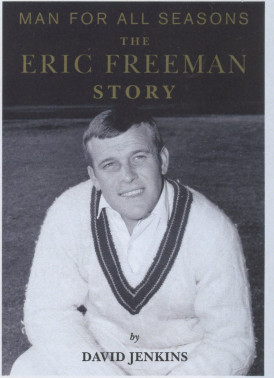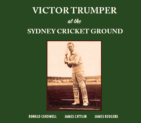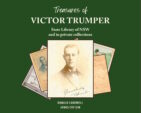Man for all Seasons
Archie Mac |Published: 2015
Pages: 336
Author: Jenkins, David
Publisher: Cricket Publishing Company
Rating: 3.5 stars

Eric Freeman lived every boy’s dream of chasing the little red ball in the summer and the oval ball in the winter. All at the highest level. Unfortunately with multidiscipline youngsters being asked to choose which sport to pursue at younger and younger ages we will almost certainly never see the likes of Freeman again. It would have been interesting to know which sport, aussie rules or cricket, Freeman would have chosen if a 17 year old now. This is perhaps the only aspect of Freeman’s life we don’t learn about in David Jenkins’ biography of a true all-rounder*.
Jenkins’ commences his narrative, uniquely, with a family tragedy and this shows Freeman in all his vulnerability and also in his strength. A family man, with strong faith and great moral fortitude, Freeman, and his wife too, allowed the author into their pain and the result was a great opening chapter. That first chapter was the only one that Freeman was allowed to see before Man for all Seasons was published, which suggests trust between subject and author. After the emotional start the book follows the usual pattern and chronicles Freeman’s personal and sporting career year to year.
As is typical of most dual sportsmen Freeman reached the heights of aussie rules well before establishing himself in cricket. So early on we learn about his exploits as a long kicking, though inaccurate, forward. Jenkins supplies rather more information on aussie rules than to be found in most cricket books. This might be a little tiresome for some English readers and perhaps even from those in the Northern states in Australia. For the aussie rules fan the discourse on the winter game is well researched and written.
Freeman played for Port Adelaide, the Collingwood of South Australian football, the most despised of all opposition supporters. Freeman was an outstanding player and Port enjoyed great success in his time playing in a number of grand finals, although unfortunately for our subject Freeman only enjoyed the ultimate success on one occasion.
Playing in such a physically demanding sport such as aussie rules, Freeman’s injuries were varied and many and impacted on his cricket career. He was a fast bowler and hard hitting lower order batsman. If he played today he would have been in demand in both ODI and 20-20. For most of Freeman’s career, he was at his peak in the late 60s, Test cricket was the only real option to representing your country at cricket. The problem was Freeman didn’t take enough wickets at Test level and his batting was never going to keep him in the side. The result was just 11 Tests. Still he earned a trip to England and the subcontinent, so it could be argued that he achieved more than most with a truncated career.
Jenkins covers all of Freeman’s Test as well as his first class career. Freeman played in the South Australian side with some of the greats, including the Chappells and Barry Richards. Don Bradman also features in the story and intervened with Freeman’s bank employer to allow him to continue with both his cricket and banking career in the amateur period in which Freeman played.
By the end of the book, by which time Jenkins has taken us through still more heartache in the Freeman family, we have a portrait of a sportsman and a man that is as complete as any biography yet produced of a cricketer. The cover of this paperback book has a large picture of Freeman on the front. While I perused it my wife commented ‘he has a nice honest face’. That simple assessment perhaps sums up Freeman; an honest, hardworking family man, who just happened to be a courageous and talented sportsman.
Despite Man for all Seasons being over 300 pages long there appear to be no typos or factual errors which is a credit to the author. The publishers should also take a bow, as the book is nicely produced with copious photos on quality paper. Man for all Seasons is recommended, especially for those who have ever dreamt of chasing a cricket ball in the summer and an oval ball in the winter.
*The author was kind enough to answer my query in an email and wrote “He (Freeman) rated playing cricket for Australia as the pinnacle and would have chosen cricket if it came down to cricket for Australia or football for Port Adelaide”.






Leave a comment